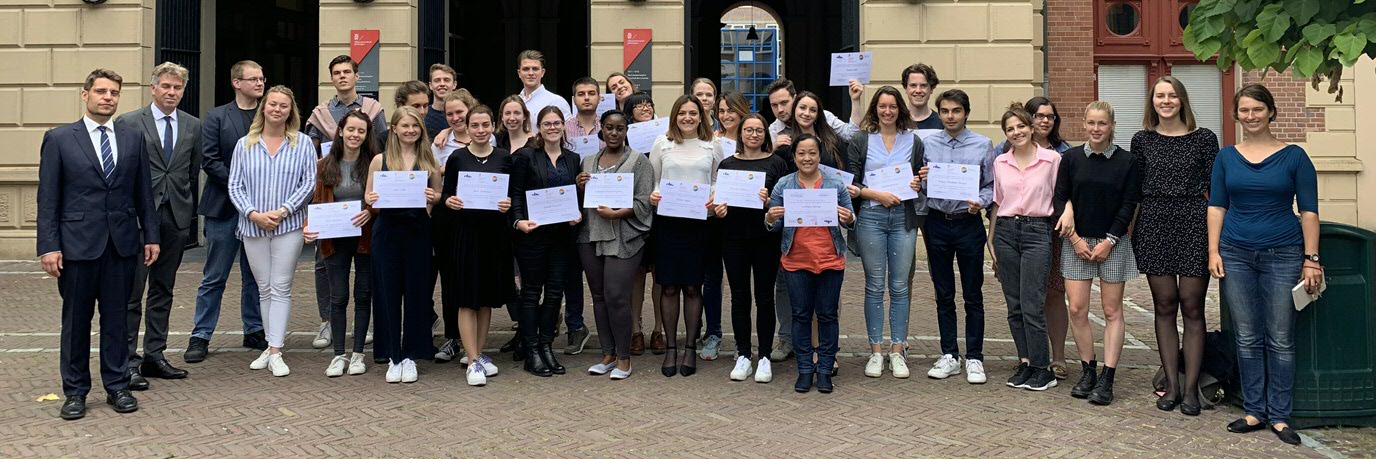Successful Summer School Energy Law of ELSA and GCELS
The European Law Students’ Association Groningen (ELSA Groningen) and the Groningen Centre of Energy Law and Sustainability (GCELS) realized a successful Summer School in Groningen between 1 and 7 July 2019. The school was running under the theme 'Energy Law – Promoting the Production and Use of Renewable Energy Sources'. 23 participants from over 10 European countries came to Groningen to learn more about this topic.
The academic programme was developed by the Director of GCELS prof. mr. dr. Martha Roggenkamp in collaboration with dr. Ruven Fleming. The programme was taught by lecturers from GCELS and New Energy Coalition (NEC). The initiative for the Summer School was taken by Gabriele Simakauskaite, the President of ELSA Groningen and a current LL.M. Energy and Climate Law student.
The lectures focussed on a number of timely topics in the renewable energy sector. Amongst others the participants learned about the conceptualization of energy transition in law, new approaches towards local energy production and its impact on the distribution system, the large-scale production of renewable energy sources at sea and regulating offshore electricity networks. Further lectures discussed the financing of renewable energy projects at sea and investment protection in renewable energy sources, the conversion of renewable energy sources to green hydrogen offshore and the regulation of electricity storage.
Alongside the lectures the participants worked on propositions covering the topics of the lectures. The propositions deepened knowledge via independent analysis of legal documents. The final presentations took place in a debate format whereby each of the propositions had to be defended by the participants. The dean of the Faculty of Law of the University of Groningen prof. mr. dr. Jan Berend Wezeman closed the academic programme and presented the certificates of attendance to the participants.

The summer school also consisted of various field-trips, inter alia visits to the Energy Transition Centre (EnTranCe) and the HESIlab, where the participants learned more about energy efficient buildings and emerging technologies in the energy sector. The participants attended a symposium where they learned about the developments in the North Sea offshore energy production and the PhD defence of GCELS-staff dr. Lea Diestelmeier on ‘Unlocking Flexibility with Law: Developing a Legal Framework for Smart Electricity Systems’.
The social programme introduced the participants to the history, day-to-day life of the city and the social life of students, showing the most unique and exciting places the city has to offer.
Under the impression of the summer school, some of the participants decided that they will return to Groningen to pursue their LL.M. in Energy and Climate Law. The organizers of the Summer School are looking forward to a continuous collaboration between GCELS and ELSA Groningen.
| Last modified: | 18 October 2023 11.14 a.m. |
More news
-
07 May 2025
Public Academy lecture 'The right to demonstrate' 22 May 2025
Thousands of demonstrations take place in the Netherlands every year. These demonstrations raise many questions about the right to demonstrate. This topic is the subject of the Public Academy for Jurisprudence on 22 May at 07.30 p.m. - 9 p.m. During...
-
07 May 2025
Maffiapraktijken in Nederland: zijn we gewaarschuwd?
Nederland krijgt te maken met steeds gewelddadigere criminaliteit: liquidaties op klaarlichte dag, bedreigde journalisten, en explosies bij woningen. In Nederland zijn we dit niet gewend.
-
22 April 2025
Impact | Online advice about right to freedom of assembly
In the coming weeks the nominees for the Ben Feringa Impact Award 2025 will introduce themselves and their impactful research or project. This week: Noor Swart and Berend Roorda, on their online information initiative on the right of freedom to...
